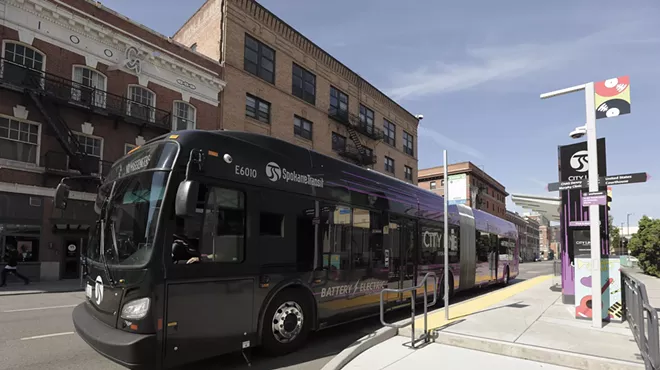
For several years, the Inland Northwest has been learning that Jim Crow-style segregation wasn't just a thing in the South. Communities all over Washington participated in legally documented racism by putting racially restrictive covenants on properties in an effort to keep anyone who wasn't white out of certain neighborhoods.
In 2021, the Washington Legislature tasked teams at Eastern Washington University and the University of Washington with finding all such properties in the state.
Eastern's "Racial Covenants Project" team has now located nearly all of the racial covenants in Eastern Washington, and Spokane County will be the first to see the results of that research.
What they found is disgraceful.
There are thousands of parcels with deeds or titles containing language such as "No race or nationality other than the white race shall use or occupy any building" on that land unless that person is a domestic servant.
Some cemeteries and crypts were restricted "only for the interment of the dead of the Caucasian race."
Other covenants were more specific, discriminating specifically against anyone "of the Ethiopian, Malay or any Asiatic race" or "members of the Latin or Colored race."
Racially restrictive covenants haven't been legally enforceable since a 1948 Supreme Court decision ruled them unconstitutional. But until the Fair Housing Act passed in 1968, it wasn't illegal to record them, and many developers continued to include them in their deeds throughout the midcentury.
The earliest racial covenant that Eastern's team found was written in 1928. The latest was written in 1955, by William Cowles Jr., who helped create what was intended to be an all white neighborhood in the Comstock area of the South Hill and whose family still owns the Spokesman Review. (When news of the racial covenants broke in 2016, Betsy Cowles, chair of the Cowles Company, told reporters that "such racial segregation is offensive and in no way represents our company or family values." The Spokesman has covered the topic extensively.)
Now, the Racial Covenants Project is poised to start sharing its findings with the public, and thanks to changes made by the Legislature over the last several years, there are now at least two methods for property owners to legally address those covenants.
BRINGING ATTENTION TO THE ISSUE
When Logan Camporeale — now a historic preservation specialist in Spokane — was getting his master's degree at Eastern, he sort of stumbled upon the issue of racial covenants.He was working in the state archives when a property owner called to figure out if their deed had any rules that would prevent them from building a fence. Covenants, conditions and restrictions can be placed on a property to restrict a number of things, from the types of plants allowed in a yard to the colors that houses in that neighborhood can be painted.
"Sure enough there was a restrictive covenant on her property," Camporeale says. "It did not include any provisions about a fence, which was good for her, but I noticed a pretty insidious racial provision in there."
That sparked his interest in researching further, and he learned that UW history professor Jim Gregory was already looking into those restrictions and mapping them in the Puget Sound area. Gregory is now leading the UW team locating the covenants on the west side of the state.
After Camporeale found dozens of the covenants in Spokane County records, he started mapping the problem locally and bringing attention to the history through his blog in 2016.
Soon, he and others wanted to know if there were legal remedies available to strike that language.
Deeds and titles are legally protected records. To change the covenants, you typically have to get a judge involved.
In 2018, the Legislature amended state law to allow homeowners to add a new document to their property records officially declaring that the racial covenants are void. But that process doesn't remove the original language.
That same year, after learning about his neighborhood's history, a Comstock homeowner went to Spokane County Superior Court to try to remove the racial covenant from his title and the public record.
When Spokane County Auditor Vicky Dalton objected, the case received widespread media coverage. The county argued that, as the auditor, Dalton is not allowed to alter the historic record.
The court issued an order striking the covenant as void, and said a copy of that order could be included in the property files. But the order did not require Dalton to remove the original covenant from the file.
The homeowner appealed, and in a split decision the state Court of Appeals upheld the lower court's ruling, saying that there was no need to physically alter the existing records.
The homeowner appealed again, but before the state Supreme Court weighed in, the Legislature addressed the issue in 2021. In the same law that tasked UW and Eastern with finding all the racial covenants in the state, lawmakers created a judicial remedy to strike the covenants from the chain of title.

REMEDIES
Under the relatively new process, which requires people to go to Superior Court and get approval from a judge, the original covenant document is copied, and then that copy is redacted to remove the offensive language. The copy is then placed in the file, while the original is stored elsewhere, either in the auditor's office or with the Secretary of State's archives division."No documents are destroyed," says Dalton, who helped draft the new remedy. "Removing history is erasing history, and erasing history means you can deny it ever occurred, and that is not acceptable."
The new process changes the status of the racial covenant from a "recorded" document, governed by specific state laws, to a historical one.
"In its place will be a document that says, 'This document was removed and is now replaced by the redacted document,'" Dalton says.
It appears no one locally has used that option, which could be expensive, as people need to gather specific documentation and go through the court process.
The other option approved in 2018 — which allows people to file a "restrictive covenant modification" — is simpler and free.
In that process, a document is added to the file. It says, in part, "This document strikes from the referenced original instrument all provisions that are void and unenforceable under law."
So far, Spokane County has had five property owners file that modification document, according to a search run by Dalton's staff this week, but that number could soon grow.
Vista Title and Escrow, a Spokane title company, announced this month that they are now offering to file that modification form for free for their customers while they're closing the deal on a home they're buying.
"It's just been kind of sticking with me that this modification document is out there and available to owners but not very many people take advantage of it," says Anthony Carollo, the company's CEO.
Carollo says it was inspiring to hear about a Tacoma neighborhood that filed dozens of the modification documents. He realized if the form was prepared for them, people were happy to sign it.
"The lightbulb came on that we could do this for our buyers as we close our transactions," Carollo says.
Even though it's illegal now to enforce the racial covenants, nobody can predict how laws might change over the next 100 years, just as people in 1924 couldn't predict the political climate today, Carollo says.
"It's meaningful to declare those void," he says. "It's an opportunity to take a stand. If the front of our office building, or maybe a lunch counter at the local restaurant was chiseled with 'whites only,' you'd want to fix that. It might be part of history ... but this is an opportunity to say, 'That's not right on this piece of property that I control.'"
The modification forms are available on the Spokane County Auditor's webpage, but county staff are not allowed to help homeowners fill them out.
However, Carollo says that Vista Title staff can help explain how to find the information needed if anyone discovers there's a racial covenant on their property and they want to file the modification on their own.
"We just can't prepare it for them unless we're doing a real estate transaction," he says.
MAPPING THE PROBLEM
Eastern's research team is just about ready to publish the first map showing where they found racial covenants in Eastern Washington."Our Spokane map is the first — and most challenging — map that we have created," says Tara Kelly, the director of the project at Eastern.
Spokane is one of the counties that "has digitized all of the property ownership records back to dirt," Dalton says. So have about half of the 20 counties the team researched.
The UW team created a tool to help search those scanned records for racial covenants, which sped up the process on both sides of the state. The teams verify the results, removing any false positives triggered by unrelated references to terms such as "white" or "black," Kelly says.
For the other half of the counties, professors and student employees traveled to auditors' offices to dig through deed books by hand.
"Each volume is about 600 to 800 pages, I feel like they're about half as tall as I am, and they're very heavy, dusty and delicate. We would just work all day until they kicked us out at lunch, and we'd come back until they closed," Kelly says. "It's been a really neat way to interact with the people and the archives across the state."
Doing that work, it could be a little exciting to come across a racial covenant after hours of searching, says Larry Cebula, a history professor at Eastern who's helping run the team.
"When you find one you're so happy because you've been working so hard, but then you go, 'Wow, this is terrible,'" Cebula says.
The good news is that only a small minority of developers wrote these covenants, Cebula says.
Of the many tens of thousands of parcels and properties in the eastern part of the state, the team has found roughly 6,500 modern parcels that have racially discriminatory covenants.
But those who wrote racial covenants from the 1940s to the 1960s didn't seem to care if they were legal.
"There's a 20-year period where some developers are writing these even knowing they can't be enforced, because they send a message, and maybe they will be enforceable later," Cebula says.
It's somewhat similar to "trigger laws" passed while Roe v. Wade was still in effect, which would immediately ban abortion if Roe was ever overturned (as it was in 2022), Cebula says.
"I think we're all too aware nowadays that rights can be taken away as well as granted," Cebula says. "This wasn't just informal racism. This was something done with the power of law."
Camporeale, who has also been working with Eastern's team, says that it's important that there are remedies available now.
"It's my position that folks should have access to remedies when there's something impacting their property, particularly something as repugnant as a racial restriction," Camporeale says. "In order to pursue the remedy, we need to know where they are. It's important work, and I'm just playing a small part in it." ♦



























